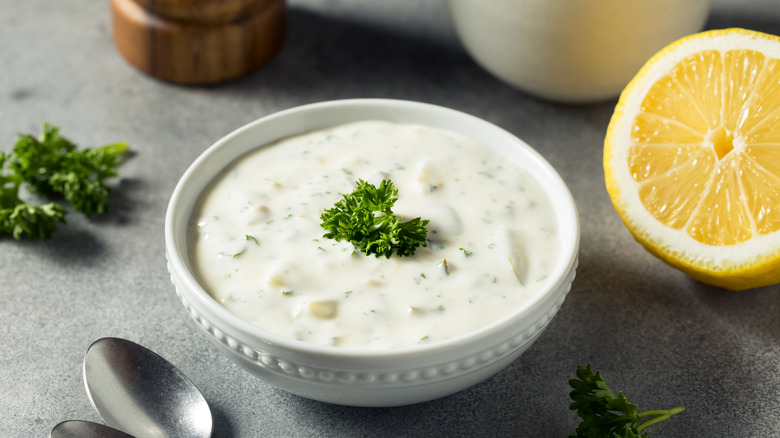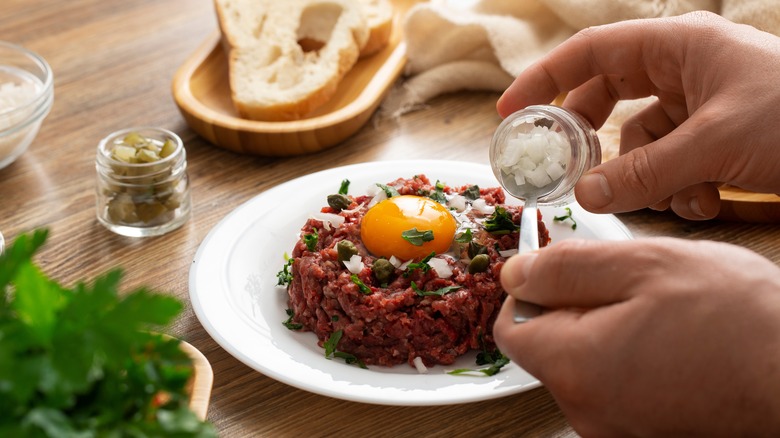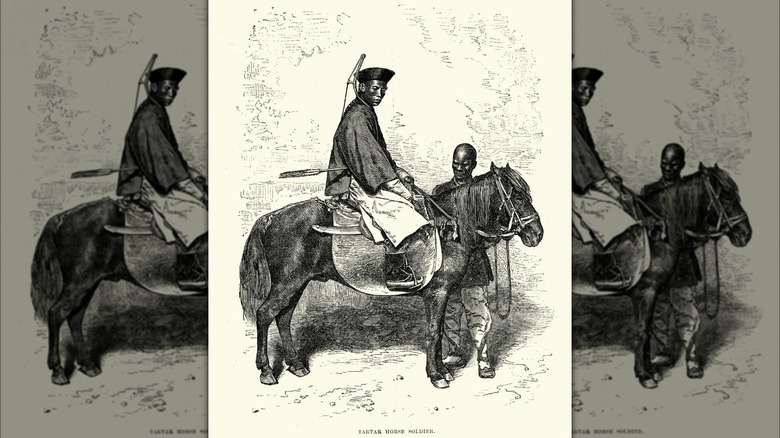Did The Tartars Invent Tartar Sauce?
Tartar sauce isn't just for fish — it's an awesome flavor booster for any dish that's in need of a tangy flavor boost. Don't let its simple recipe fool you, though. This blend of mayo, lemon juice, herbs, and Worcestershire sauce has a surprisingly complex history that's puzzled people for centuries. Most of the confusion comes from the name, as the word "tartar" pops up in many different and often unexpected places.
You'll find it in cream of tartar, another kitchen ingredient that's often used in old-fashioned baking recipes. Despite the names sounding similar, cream of tartar has nothing to do with our tangy sauce. Then, there are the Tartars (also spelled "Tatars"), a Turkic ethnic group with a rich history in the steppes of the borderlands between Eastern Europe and Central Asia. While the Tartars have their own delicious cuisine with gems like pilmän (a kind of meat dumpling served with soup), they weren't the ones that came up with tartar sauce. The first people who came up with this tangy sauce live further west, in the home of coq au vin and foie gras. Yes, tartar sauce is actually a French invention!
Dig a little deeper, though, and you'll find a surprising twist: There might be a subtle connection between tartar sauce and the Tartar people, after all. The link is hidden in the history of the very dish that tartar sauce was originally meant to be paired with, steak tartare.
Tartar sauce took its name from steak tartare
More or less, steak tartare has become a restaurant menu staple today. A serving usually consists of raw, minced beef shaped into a loaf, seasoned to the nines with fragrant herbs, capers, pickles (such as dill pickles, gherkins, or cornichons), and Worcestershire sauce. It's then served with chopped shallots and a fresh egg yolk on top for garnishing. But steak tartare hasn't always been so souped up. In the Boston Cooking-School Cookbook by Fannie Merritt Farmer, published in 1896, the recipe only mentioned salt and pepper and a dash of either A.1. or Worcestershire sauce. In this form, the dish can be quite bland.
What it sorely lacks is acidity. So the "sauce à la tartare" was whipped up by some genius minds in the 19th century to remedy this with its tangy flavor using a tart mayo base, vinegar (we mostly use lemon juice instead of vinegar today), and citrusy-tasting herbs like tarragon and parsley. No one knows who came up with it first, but they're likely French. They did invent mayonnaise, which has always been the core ingredient of tartar sauce.
By the mid-19th century, the sauce was already well-known, appearing in the 1860 cookbook, "Modern Cookery for Private Families" by the English food writer Eliza Acton. The recipe in the book described it as a remoulade (a cold mayo and herb sauce, quite similar to tartar sauce) with extra mustard, tarragon vinegar, chopped shallots, capers, pickles, and cayenne.
The faint, contentious connection to the Tartars
While tartar sauce took its name from steak tartare, the latter's name really did come from the Tartar people. In the 1998 book "Rare Bits: Unusual Origins of Popular Recipes" by Patricia Bunning Stevens, she retold a story that attributed the name of the dish to the Tartar warriors who were part of Genghis Khan's formidable military. Stevens claimed that instead of cooking their meat, the Tartars would just put it on their saddles and let the meat tenderize by friction as they rode through the steppes.
Sounds wild, but it's likely just that — a story. The narrative likely stems from Jean de Joinville, a French historian and writer in the 13th century, who painted an unflattering caricature of the Tartars (or as he called them, "Mongols"). He described them as "barbaric" people whose diet consisted of only raw meat and milk. The kicker? According to the Croatian Journal of Ethnology and Folklore Research, de Joinville likely never met a Tartar in his life.
The name "tartare" is still linked to the Tartars in most cookbooks and food history encyclopedias today, so you can say that there's a smidge of relation between tartar sauce and the Tartar people. But keep in mind that it's based on a pretty offensive, likely untrue stereotype, so maybe it's for the best that it should go unmentioned.


